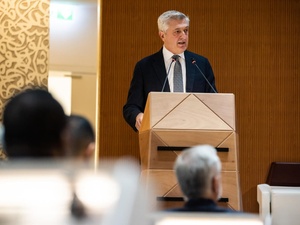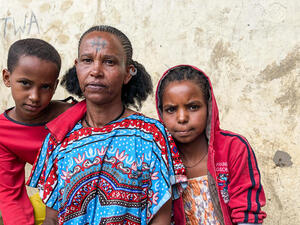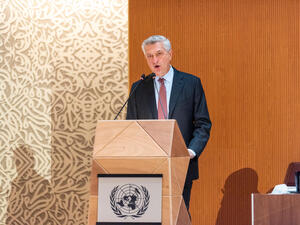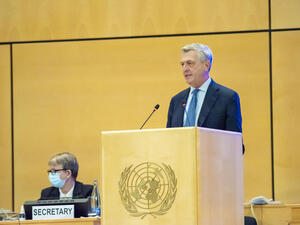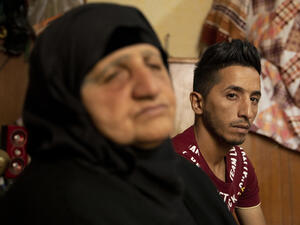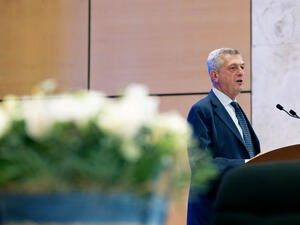Ogata stresses need for solutions to refugee plight
Ogata stresses need for solutions to refugee plight
United Nations High Commissioner for Refugees Sadako Ogata warned Monday that despite international commitments to uphold the right of asylum, standards of refugee protection are actually being eroded in many countries.
In a speech to the annual meeting of UNHCR's 51-member Executive Committee, Ogata re-affirmed the fundamental right to seek asylum from persecution. She urged decision-makers to combat prejudice against asylum-seekers and to share the burdens of major asylum countries, while also fighting the misuse of asylum. She called on states to redouble their efforts to avert and resolve conflict and asked them to provide more effective protection to people displaced within their own borders and to other civilian victims of war and human rights abuse.
Ogata told the Geneva meeting that observance of international standards for the protection of refugees had continued to slip in 1996. "Access to territory has been either denied outright, as a result of push-offs of boat arrivals and rejections at borders, or complicated by new legislative restrictions," she said. "Deadly attacks on refugee camps, sexual abuse of refugee women and children [and] forcible conscription of refugee men and children have seriously undermined safety during asylum ... the voluntary nature of repatriation is increasingly being undermined by a mounting number of forcible returns."
Noting that such problems increasingly arise in countries that shelter more than their share of refugees, Ogata appealed for more international burden-sharing. "The burdens are very unevenly divided, between and within continents," she noted. "Germany hosts more Bosnian refugees than all other countries in Western Europe together." Ogata said that refugees outnumbered the local population in parts of Ivory Coast, Guinea, Tanzania and Pakistan.
Ogata said it was "essential that the humanitarian character of asylum be preserved". Refugees must respect the law, she said, and military activities in refugee camps should be halted. Ogata went on to note that asylum could be abused by people guilty of genocide or other heinous crimes, and she asked again that states assist in getting to grips with the practical, legal and security problems involved in identifying and dealing with such individuals.
Ogata also urged decision-makers to "de-dramatize" the scale of the asylum-seeker problem in their countries. Requests for asylum were declining in most industrialized countries, she noted.
Ogata observed that the past year had seen no new humanitarian emergencies of the scale witnessed in Rwanda in 1994. However, she also noted that "armed conflict in Burundi, Chechnya in the Russian Federation, Liberia, Sudan, Sri Lanka, Tajikistan and, most recently, Iraq have again forced people to run for their lives."
Focusing on specific regions, Ogata said that the "dangerous security implications" of the Rwandan refugee situation were escalating. "Cross border raids, the targeting of survivors of the genocide and attacks on Tutsi residents in the Kivu region of Zaire, resulting in armed resistance, are causing more deaths and are undermining prospects for reconciliation," she explained. "Probably never before has my Office found its humanitarian concerns in the midst of such a lethal quagmire of political and security interests. While our humanitarian assistance and protection serve an innocent, silent majority of needy and anxious refugees, they also serve the militants who have an interest in maintaining the status quo. This cannot go on."
Ogata said that UNHCR was in the process of discussing with governments new ways to approach problems in the Great Lakes that would encompass security, justice, and political aspects.
Events in Bosnia and Rwanda demonstrated that military peace could not suffice in societies emerging from fierce communal conflict, Ogata said, adding that it was increasingly difficult to find durable solutions to problems caused by conflict. "Civilian peace, reconciliation in the broad sense ... becomes a still greater challenge than separating armies or physical reconstruction," Ogata explained. "It requires at least a minimum consensus on the future make-up of society - which cannot be imposed from the outside - and a fair balance between the often competing demands of peace and justice, of forgiveness and ending impunity. It requires just and humane solutions for those who were deliberately chased away."
Ogata noted the massive obstacles to civilians seeking to return to their villages in areas of Bosnia where other ethnic groups are in the majority. However, she noted hopeful signs of progress, including last month's elections and progress in reconstruction. "We must not give up on the right of people to return to their homes," Ogata said, but she added that "we should at the same time create conditions making it possible to rebuild their lives elsewhere, within Bosnia and in the region."
A comprehensive approach to the problems of displacement in the former Yugoslavia could help unblock complex and inter-linked problems, Ogata observed. "As conditions in Bosnia improve further, the time will come for the lifting of temporary protection", she said. In the meantime, she pleaded, "those unable to return to their home areas should not be pushed back, as long as they will not have a decent roof over their head and a decent alternative solution in sight."
Ogata went on to address recent events in Afghanistan. "I sincerely hope that as many refugees as possible will start the journey home, in peace and in full respect of their human rights, particularly those of women," she said.
There were positive signals for refugee issues in 1996, Ogata added. Many states had continued to hold open their borders to people seeking protection. Among them she cited Iran, which in September allowed 40,000 people to take refuge from fighting in northern Iraq.
The High Commissioner noted other examples of positive responses to the plight of refugees in 1996, including South Africa's accession to the basic legal conventions on refugee rights; commitments to humanitarian and human rights standards made by the countries of the Commonwealth of Independent States during a conference on displacement in May; the European Union's adoption of a common interpretation of the definition of a refugee; and progress in many countries in promoting refuge from types of persecution that almost exclusively involve women.
Ogata also cited the successful repatriation of 1.7 million refugees to Mozambique, where in July UNHCR closed its programme. In Mali and Togo, some 100,000 refugees had returned in the past year, and said efforts were ongoing to return refugees voluntarily to Somalia, Ethiopia and Angola.
Such successes implied that "refugee problems are less insoluble than they often appear to be," Ogata noted. But she added that "solving them requires time," and the return of refugees could only be durable if it were accompanied by lasting reconciliation and peace. The international community should assist countries make the transition towards peace and development, she said, observing that "The absence of visible peace dividends can clearly compromise the process of peace building and healing." Within the limits of its mandate and against relatively low costs, UNHCR would stand by to avert unnecessary displacement, Ogata said, by helping in the process of reconciliation and serving the victims of war and persecution.




